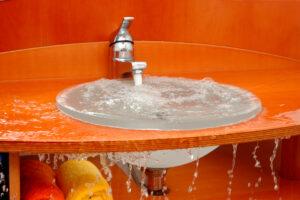9 Steps to Prevent Clogged Drains
 You expect your plumbing to flow freely, so it’s frustrating when sinks and bathtubs start backing up. While it’s possible to clear clogged drains with a plumber’s help, prevention is the best medicine. Follow these nine steps to prevent clogged drains and sewer lines.
You expect your plumbing to flow freely, so it’s frustrating when sinks and bathtubs start backing up. While it’s possible to clear clogged drains with a plumber’s help, prevention is the best medicine. Follow these nine steps to prevent clogged drains and sewer lines.
1. Install a Lint Catcher in Your Washing Machine Hose
If your washing machine drain has never clogged, consider yourself lucky. Lint, tissue fibers, and even the occasional sock can sneak into the washer’s drain hose and cause trouble. Luckily, you can keep your drains clean with a mesh lint catcher available at your local hardware store. You can even use an old nylon sock and a zip tie to make a DIY lint catcher.
2. Catch Hair Before it Flows Down the Drain
Hair is a common culprit of shower drain clogs. To keep your pipes flowing freely, remember to brush your hair before you shower. This removes loose strands from your head so they don’t end up down the drain.
Then, consider installing a mesh screen or replacing the original stopper with a perforated hair catcher. Mesh drain covers are also useful in the bathroom sink. Empty these screens regularly to keep the water flowing.
Do you wash your dog in the bathtub? An easy hack is to place a washcloth over the drain when you remove the stopper. This catches all the loose fur and dirt, making it an important step to prevent clogged drains.
3. Watch What You Flush
It’s tempting to flush personal care products, but you should never treat the toilet like a trash can. Things like paper towels, facial tissues, feminine hygiene products, cotton balls, and baby wipes aren’t designed to dissolve in water, so they can easily clog the toilet. To prevent trouble, only flush human waste and a conservative amount of toilet paper.
4. Collect Food Scraps for the Compost Pile
Sending food down the kitchen sink is convenient, but it can lead to clogged drains. Instead, start collecting scraps in an organic waste container and adding them to a compost pile in the backyard. Just remember to avoid putting meat or greasy food waste in the pile because these items take too long to break down.
5. Don’t Pour Grease into the Sink
Cooking grease may be a liquid when hot, but it cools into drain-clogging sludge. To prevent a major clog, pour grease into an empty jar or can, wait for it to solidify, and dump it in the trash. You can even save leftover bacon grease to add flavor to future meals. Simply pour the grease into a sealable container and place it in the fridge.
6. Flush Out Your Drains
Low-flow toilets, showerheads, and faucets save water, but they don’t carry debris away as effectively, making your drains more likely to clog. Counteract this problem by flushing your drains once a week.
First, fill sinks and bathtubs halfway with hot, soapy water, and pull the plug. Then, rinse the sewer line by pouring a five-gallon bucket of water into the toilet bowl while simultaneously flushing.
7. Use Bacterial Drain Cleaner
What do hair, grease, and food have in common? They’re all organic sources of drain clogs. This also means they’re food for bacterial drain cleaner. That’s right—you can break down organic matter in your drains with bacteria, which, unlike chemical drain cleaners, are biodegradable, non-corrosive, and safe for the environment.
Bacterial drain cleaner is available in liquid and granular form. Apply it once a month or as directed on the packaging to prevent clogged drains naturally.
8. Clean the Pop-Up Sink Stopper
The stopper in your bathroom sink attracts hair and other debris. This is good news because it helps keep your drains clean, but it can also lead to slow drains if too much waste accumulates. Low water flow also raises the risk of clogs further down the drain. If you notice your sink starting to drain more slowly, remove and clean the stopper to get things flowing again.
9. Don’t Ignore Frequent Mainline Blockages
Does your sewer line clog every couple of years? Don’t just keep cleaning it—call a plumber who can pinpoint the cause. This way, you tackle the underlying problem instead of merely treating the symptom.
Tree root intrusion, partially collapsed pipes, and rotted-out plumbing are common causes of recurring mainline blockages. If a sewer camera inspection reveals any of these problems, you can fix them and stop dealing with frequent sewer clogs and backups.
Schedule Drain Cleaning Service in Houston
If your drains are frustratingly slow or have come to a complete halt, reach out to Redfin Plumbing. We service all types of drains, from kitchen and bathroom sinks to shower and bathtub drains to toilets and main sewer lines. Trust our team to quickly diagnose the cause, clear the clog, and offer personalized tips to keep your drains clean from here on out. For more information, please call (346) 319-5342 or contact us online. We proudly serve Houston, Cypress, Katy, Sugarland, Pearland, the Woodlands, Kingwood, and the surrounding Greater Houston area.
